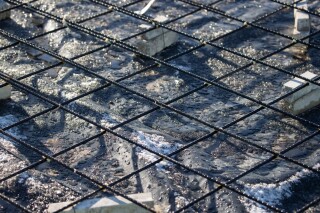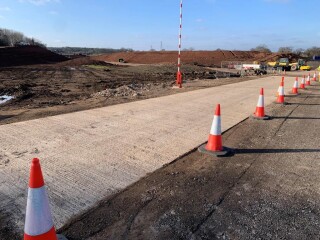Over the past year Skanska, alongside the National Composites Centre, Tarmac, Basalt Technologies and National Highways, has carried out a trial on a low carbon reinforced concrete – made with no cement and no steel.
The trial was carried out at Skanska’s £282m M42 junction 6 project for National Highways. Cement-free concrete with basalt fibre reinforcement was used on a temporary haul road for construction vehicles. Analysis, now published, shows no loss of resilience or product performance.
Tarmac provided two types of concrete for the trial: a mix comprising conventional blended cementitious material and a low carbon alternative mix incorporating an alkali activated cementitious material (AACM) in place of the cement. This AACM concrete was mixed at a conventional concrete plant close to the project and installed in the same way as traditional materials.
The reinforcement steel replacement was of Bastech, a basalt fibre reinforced polymer rebar. This is five times lighter and twice as strong as steel rebar and is naturally resistant to corrosion, alkalis and acids.
The AACM concrete delivers a carbon footprint up to 80% lower than a standard CEM I concrete, it is claimed, while the basalt rebar averages 60% less than steel.
The trial involved the construction of four concrete slabs on temporary haul roads on the M42 junction 6 highways improvement scheme. The slabs were laid in December 2021 and were made up of:
- Slab A – conventional concrete + steel reinforcement
- Slab B – low carbon concrete + steel reinforcement
- Slab C – conventional concrete + basalt reinforcement
- Slab D – low carbon concrete + basalt reinforcement
The road was used by construction vehicles throughout the trial period, with in-situ and laboratory tests carried out over a number of months. Full scale specialist lab tests involved bending and shear testing of the four types of slabs. [See our previous report here.]

The results have provided knowledge of the curing process, ease of construction, safety benefits, functional properties and structural behaviour of the various concrete and reinforcement combinations. This has given insight into the future use of longer lasting materials in construction.

The National Composites Centre calculated the carbon throughout the lifecycle of the structural element and carried out an environmental performance assessment.
The trial has been deemed such a success that Skanska and National Highways now plan a trial on a permanent road structure, capturing data and analysis for future publication. The ultimate aim is to roll out basalt fibre reinforcement across the UK’s strategic road network.
Skanska is also working with HS2’s innovation managers to progress the learning from the trial and use the innovative combination of materials in other structural reinforced concrete elements beyond roads.
Skanska highways director Glennan Blackmore said: “The results of the trial are extremely encouraging. By working together, we have been able to speed up the process of testing and analysing a new solution for de-carbonising our road network, with the aim of getting it to market so the whole industry can benefit.
“By using a unique combination of materials, we are working to not only cut carbon, but also improve the structural performance of reinforced concrete, delivering better productivity, safety and cost outcomes. We’re delighted at the success of this trial and we’re now really looking forward to starting the next stage.”

The trial also provides a better understanding of the impact of using the new materials – including the use of composites in the design of concrete structures – ahead of the proposed revision to Eurocode 2 standards, Skanska said.
National Highways project manager Adam Gallis said: “At National Highways, we were delighted to use our innovation and modernisation designated fund pot to help make this trial a reality. In utilising this funding, we can go above and beyond what we would typically deliver on our schemes and in this instance, working alongside the supply chain, we have made great strides in the development of a low carbon reinforced concrete alternative. We will look to do what we can to facilitate further trials in this sphere, to ultimately drive down our carbon footprint and achieve our net zero targets.”
The video below is from earlier this year.
Got a story? Email news@theconstructionindex.co.uk


